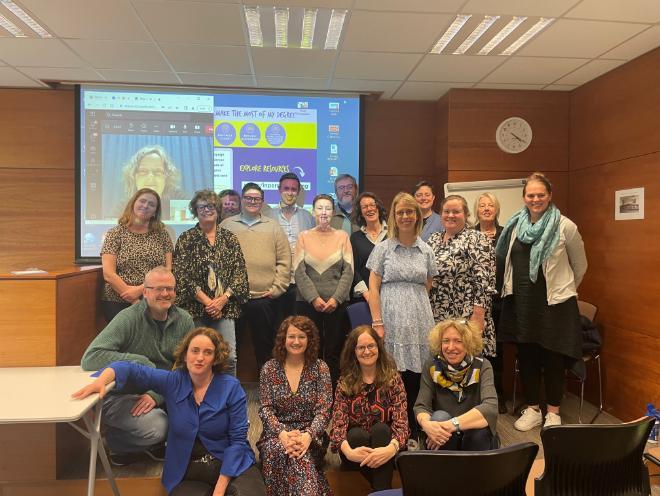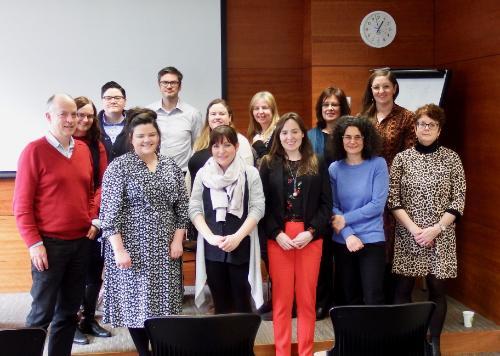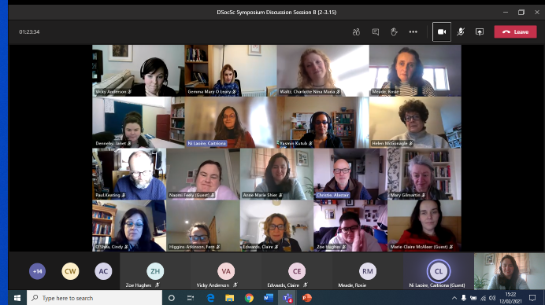In This Section
What is the Doctor of Social Science (DSocSc)?
The Doctor of Social Science (DSocSc) at University College Cork was established in 2005 and is a four-year advanced programme which provides the opportunity for experienced professionals based in public sector agencies, voluntary/community organizations, educational institutions and international non-governmental organisations to work on complex issues that are of direct relevance to their professional practice and organisational contexts. As an alternative to the traditional research-based PhD, the DSocSc provides a more structured learning environment that combines both teaching and research. Participants currently enrolled on the programme bring a range of different professional backgrounds, including public sector management, social research, education, community work, international development, social work and youth work.
Professionals working in the above areas are increasingly being expected to ground their practice and decision–making in evidence from research and evaluation. The DSocSc programme provides participants with the opportunity to:
- Acquire competency as an autonomous researcher able to undertake and interrogate research and to communicate its outcomes.
- Gain a deeper understanding of theoretical frameworks underpinning the social sciences and social policy and examine how these can bring insights to their own practice and organisation.
- Develop skills in qualitative and qualitative and quantitative research design and methodologies in order to produce reliable primary data, and be able to analyse and critically evaluate primary and secondary data.
- Identify the roles of research and evaluation within organisations and apply existing research findings to issues emerging in the workplace and other relevant contexts.
- Demonstrate intellectual/professional leadership through the use of research as a method of developing organisations and service provision.
DSocSc Programme Themes
The DSocSc programme is underpinned by a number of key themes which run throughout the four years and are reflected in the modules offered:
Conducting social research: from design to dissemination . The focus here is on qualitative and quantitative research methods and skills as well as the experience and politics/ethics of conducting social research.
Social policy debates and processes . Contemporary social policy debates are engaged with in order to strengthen students’ analytical skills in critically evaluating policy-making processes and outcomes.
Social justice. What does the creation of a more socially just and equitable society mean and entail? The programme addresses this question by examining ideas of social justice and how these are applied in professional practice, policy debates and research.
Integrating research in organisational contexts. The application of research in organisations receives repeated attention in the modules offered in this programme.
Programme Structure
The DSocSc is a four year programme, with eight modules taught across the first two years (four in each year). These modules provide students with the necessary skills to undertake their own substantive research in years three and four, resulting in the production of a thesis of approximately 60,000 words.
YEAR ONE (90 credits)
Semester 1 (September – December)
Module 1: Introduction to Social Research (15 credits)
Module 2: Philosophies of Social Science (15 credits)
Semester 2 (January – April)
Module 3: Research Methods and Skills 1: Qualitative (15 credits)
Module 4: Social Policy Debates and Processes (15 credits)
Participants also undertake 30 credits of thesis work.
YEAR TWO (90 credits)
Semester 1 (September – December)
Module 5: Research Methods and Skills 2: Quantitative (15 credits)
Module 6 : State and Society (15 credits)
Semester 2 (January – April)
Module 7 : The Politics of Social Research (15 credits)
Module 8 : Designing for Research and Evaluation (15 credits)
Participants also undertake 30 credits of thesis work
YEAR THREE
Supervised research/thesis work (90 credits)
YEAR FOUR
Supervised research/thesis work (90 credits) culminating in production of 60,000 word thesis.
*Online individual and group tutorials throughout the course
Mode of Teaching/Learning & Student Support and Assessment
The DSocSc is a collaborative professional learning and research programme which is delivered through a combination of distance and face-to-face approaches. Modules are taught via week-long workshops held at UCC (four weeks in years one and two, and shorter thesis workshops in years three and four) supplemented by online group and individual tutorials which enable participants to build on and maintain continuity between workshops. This approach seeks to provide participants with the flexibility to manage their learning in ways that suit their professional and personal lives. It is expected that students will spend approximately 15 hours on study per week, including reading, research and participation in online discussions throughout the programme, although this may vary at particular times in the year.
Student Support and Assessment
The programme is based on a pedagogical philosophy of self-directed learning, with peer and tutor support playing a role in enabling participants to be connected to, and part of, an interactive learning community. Indeed, a key strength of the DSocSc programme is that students benefit from each other’s experiences in a more structured learning environment than would be so in the case of conventional PhD research.
View videos of previous participants explaining why they like the pedagogic approach taken on the programme:
Dr Pat Bonello; Dr Marguerite Hughes; Dr Fiachra O Suilleabhain; Dr David Williams
Students will be provided with tutorial support from the beginning of the programme. The tutor will support the participant in a variety of ways, for example by facilitating the development of necessary learning skills, advising on written and project work, and supervising the research dissertation.
Most of the modules in Years One and Two are assessed via written assignments (5,000 words). However, continuous thesis work during these two years also moves students towards the production of a substantive research proposal and programme of research to be undertaken in Years Three and Four. In Years Three and Four, participants work with an individual supervisor (supported by group workshops) to produce a 60,000 word dissertation. Although shorter in word count, the dissertation is similar in form to, and as intellectually rigorous as the conventional PhD thesis. However, it may be more concisely written and presented, as it does not have to demonstrate the full range of the student’s competence, which is assessed over the full four years through a variety of challenging assignments.
Areas of thesis research of recent and current DSocSc students include:
Community participation in regeneration initiatives in Ireland
Women’s experiences of separation/divorce in Ireland
Exploring social workers’ professional identities
The construction of children in Irish policy discourses
Using narrative research methods to analyse the supervision of community work students
Problematising Big Food’s appetite for policymaking

Some DSoc participants at the biennial DSocSc Symposium in 2019 (below) and 2023 (left):

Testimonials from DSocSc graduates:
I really enjoyed the DSocSc programme.... I particularly enjoyed the taught classes, robust inputs and the exchange and support among class mates for all of our work. I had fantastic tutors who saw me through all the way to the end. The last six months completing the thesis was very challenging but the three and half years to then was very rewarding and I know it has made me a better community worker, researcher and consultant. Dr. Maria Power.
The DSocSc programme was just what I needed at that point in my career - a chance to go deep into an issue which I was facing in my work and strengthen my research skills at the same time. The mix of teaching and independent research was very helpful both in keeping my project on track and in feeling part of a research community. Overall, the programme was very hard work and a big time commitment, but I am certainly glad to have done it. Dr Cliona Loughnane.

Members of the DSocSc community at the Biennial DSocSc Symposium which was held online during the pandemic in 2021
Recent guest speakers have included:
Professor Mairead Dunne (Sussex University), Becoming a Researcher: struggles with position, power and process
Professor Violetta Zentai, Central European University (Vienna-Budapest), Duty to Care and Solidarity: counter-hegemonic civic acts in authoritarian and xenophobic contexts
Professor Mary Gilmartin, Maynooth University: Reimagining immigrant integration
Dr Sinead McMahon, Limerick Institute of Technology: Doing policy analysis research using governmentality perspectives
Professor Maggie O’Neill, University College Cork: Participatory Arts and Social Action Research (PASAR): Co-Producing Knowledge with Migrant Families through Participatory Theatre and Walking Methods
Professor Alice Bloch, University of Manchester: New directions and reflections for refugee related research
Professor David Taylor, University of Brighton: Happiness is not enough: a relational theory of wellbeing
Dr. Mary P. Murphy, Maynooth University: Investing in the Right to a Home
Entry Requirements
Applicants will normally be expected to have:
- A Masters degree in social science, social work, community work, social policy, or a similar relevant subject area;
- At least five years relevant postgraduate, professional experience;
- Basic computer literacy skills and online access.
In exceptional circumstances, candidates with suitable equivalent experience or qualifications may be considered for entry, subject to the approval of the College of Arts, Celtic Studies & Social Sciences. Applicants submit an application form, short written piece and references. All shortlisted applicants are interviewed. Applicants will be expected to present information on their professional experience and identify their learning objectives and reasons for entering the programme. Final decisions on acceptance to the programme take into account all submitted information, including all relevant qualifications, and interview.
Further Information
For further information and informal enquiries about the course, please contact the Programme Director:
Dr. Caitriona Ni Laoire
Email: c.nilaoire@ucc.ie
School of Applied Social Studies
Staidéar Sóisialta Feidhmeach
Contact us
William Thompson House, Donovan's Road, Cork, Ireland.,

